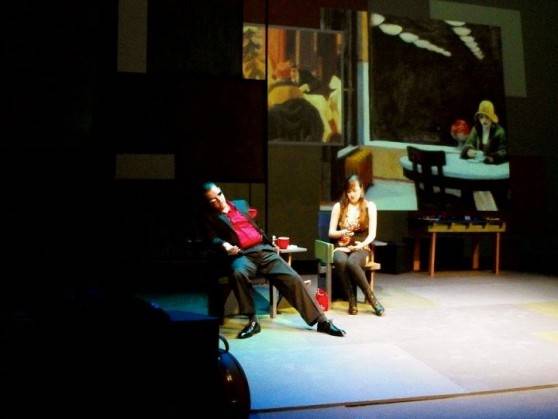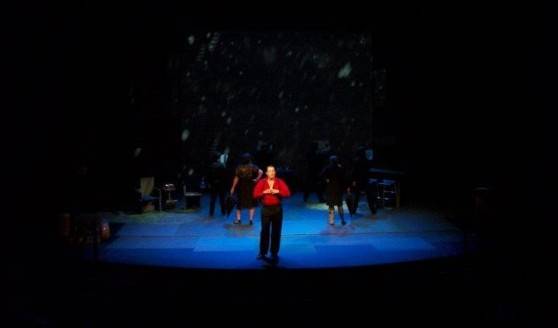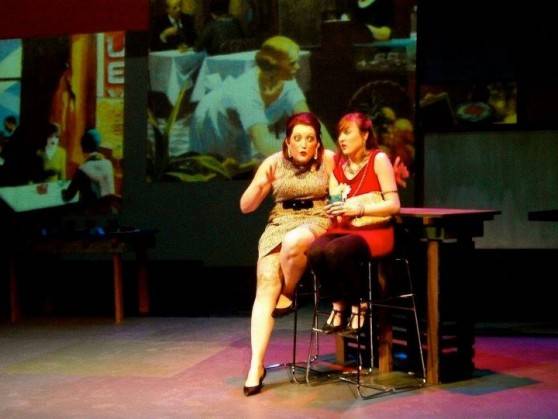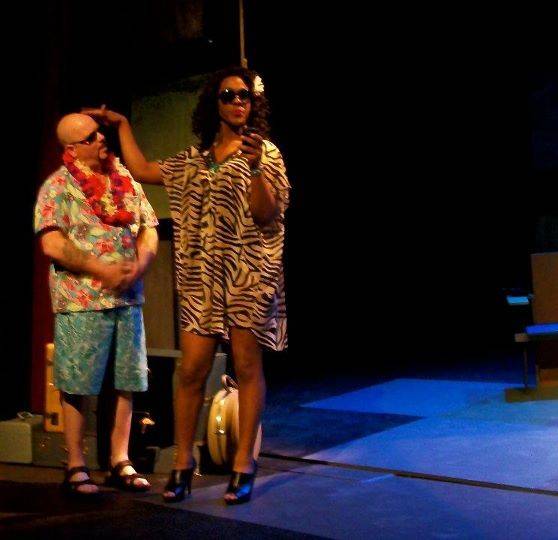 Dead Man’s Cell Phone, playing this weekend and next week at Parkland Community College, takes perhaps the most universal and harrowing question — what happens when we die? — and constructs a quirky narrative that examines our relationships with one another and the way our ever-growing obsession with technology is dividing, rather than uniting us.
Dead Man’s Cell Phone, playing this weekend and next week at Parkland Community College, takes perhaps the most universal and harrowing question — what happens when we die? — and constructs a quirky narrative that examines our relationships with one another and the way our ever-growing obsession with technology is dividing, rather than uniting us.
The dark comedy follows Jean (played by Ellen Fred), a nondescript young woman who hears a phone ringing while sitting in a café. After the man holding the phone doesn’t pick up, she answers it, and quickly realizes that the man, Gordon (Aaron Clark), is dead. Through this seemingly insignificant object, Jean then embarks on an eccentric journey, meeting Gordon’s wife, mother, brother, and mistress, becoming embroiled in his unique line of work, and traveling from a stationery store to heaven and back again.

Written by Sarah Ruhl, the play was first performed on Broadway in 2008 (starring Weeds’ Mary-Louise Parker as Jean), and its overarching themes seem to have become even more relevant just three years later. We clamor for the latest iPhone upgrade and get more and more into immortalizing ourselves through countless digital outlets, but do we ever really connect with one another? Jean herself had a disdain for cell phones before finding Gordon’s, saying:
I never had a cell phone … I didn’t want to be there, you know. Like if your phone is on you’re supposed to be there. Sometimes I like to disappear. But it’s like — when everyone has their cell phones on, no one is there. It’s like we’re all disappearing the more we’re there.
Parkland’s production of this unconventional show, directed by Thom Schnarre, features many talented actors, great lighting and sound, and excellent sets, all of which I’ve come to expect from their theater productions. Aaron Clark as Gordon gives a hilarious and dynamic monologue from beyond the grave, while Maren Brucker (playing Gordon’s widow, Hermia), has the audience cracking up at the revelations her character unveils after a few too many drinks. These two actors were given the opportunity to shine, and they pulled it off well, embodying their unique characters.


Gordon’s mistress, Miss Carlotta, is inexplicably played by a man (William Anthony-Sebastian Rose II), and I’m not sure if the script calls for this or if it was a decision of this particular director’s. Either way, Rose is convincing!

Everyone in the show, from the main characters to the small ensemble, is committed to their roles. Because of this, the actors and the production impressed me more than the story itself. The play, to me, reeks of trying too hard, trying to cram as many symbols and meanings and feelings as possible into a two-hour span. The variety of themes that the show explores have been featured in many artistic works already, and often executed better. At times, I felt like the lines may as well have been, “Look how quirky and introspective and full of meaning this show is!”
But again, despite the weaknesses of the script, the actors make it work. I might have strongly disliked the show if it had been in the hands of less talented actors, but thanks to their dedication to the roles, I did become interested in the story, even if the themes were a bit repetitive.
But, the overuse of themes does not necessarily negate our need to hear them. I found it ironic that, while watching a play called Dead Man’s Cell Phone, the girl sitting next to me in the audience couldn’t be bothered to put her own phone away. Instead of seeing what’s right in front of us, we’re constantly withdrawing into our technological devices, often to the detriment of others. They make us retreat into ourselves, and often know us better than those around us. As the story progresses, Jean must learn to put the phone down, and start living her own life, rather than the one that exists on Gordon’s phone. We shouldn’t always be staring down at our phones, waiting on a response. Life’s too short.
Future showings of Dead Man’s Cell Phone at Parkland College Theatre:
October 29 and November 3, 4, and 5 at 7:30 p.m.
November 6 at 3:00 p.m.
Trailer:
All photos from Dead Man’s Cell Phone Facebook page








